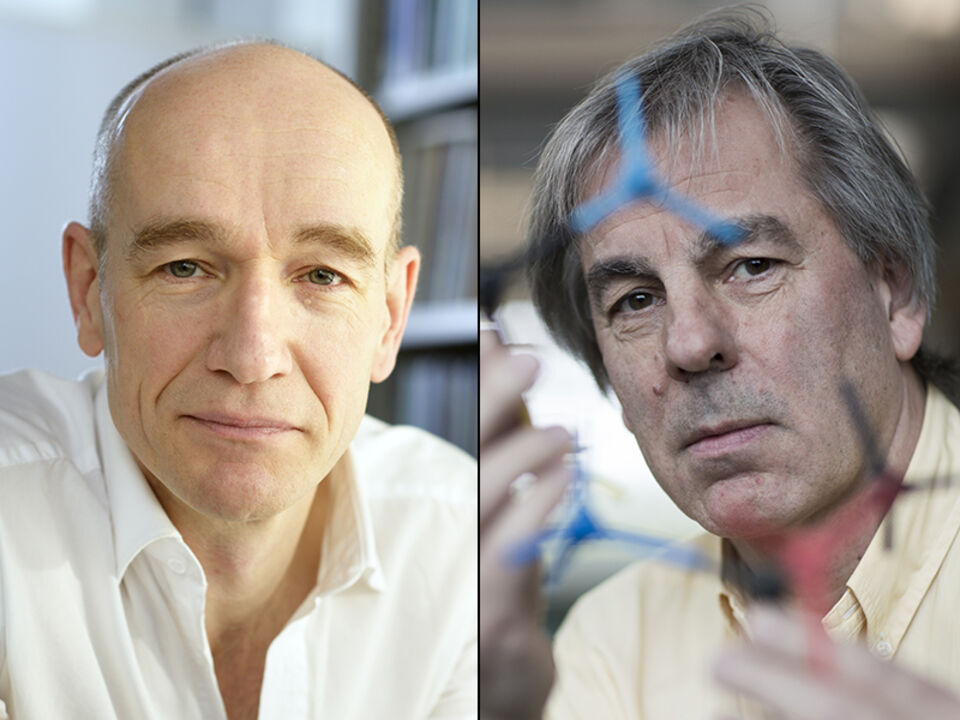European top grants for Sommerdijk and Meijer
Bert Meijer and Nico Sommerdijk are both recipients of an 'Advanced Grant' from the European Research Council. Sommerdijk, professor of Bioinspired and Multiscale Materials Chemistry, will use the grant to try to unravel the fundamental mechanisms of bone formation while Meijer, Professor of Organic Chemistry, wants to take important steps to build complex functional materials and systems step by step. It is the second time Meijer obtains this top grant from the ERC.
ERC Grant Meijer: supramolecular chemistry
The atoms in molecules are held together by solid (covalent) bonds, and there is a significant amount of human knowledge about this. To assemble molecules, however, nature often uses weaker reversible (non-covalent) bonds. This dynamic reversibility creates a world of possibilities - think of healing, growth and adaptation. However, the fundamental knowledge in this field, supramolecular chemistry, is still relatively limited, certainly in comparison with the exceptionally complex molecular machinery of life.
Bert Meijer therefore wants to boost supramolecular chemistry by enabling non-covalent structures in different steps and with different components. For inspiration, he is looking not only at nature but also at the substantial knowledge there is of (covalent) organic chemistry, with which he expects to see many similarities. The knowledge acquired should ultimately become an elementary part of polymer chemistry. He wants to replace the words self-assembly and self-organization with non-covalent synthesis, in other words: controlled assembly of complex matter.
To elaborate this, the professor of Organic Chemistry wants to develop a supramolecular hydrogel that consists of various components whereby the gel attracts the specific signal proteins required to control biochemical processes. The goal is to develop the ideal substrate to cultivate biological tissue (tissue engineering).
The third part of the research focuses on supramolecular materials that lead to 'spin filtering'. Spin is a property of electrons that resembles ‘rotation’. The filtering of spin, by applying a thin layer of certain supramolecular materials, appears to make the process of splitting water into hydrogen and oxygen much more efficient. Meijer will investigate how new materials can optimally support this essential step in making 'solar fuels'.
Meijer will receive 2.5 million euros from the ERC for his research. It is the second time he gets an Advanced Grant from ERC, which is exceptional.
ERC Grant Sommerdijk: total picture of bone formation
Human bones consist of a matrix of the soft material collagen in which the hard material calcium phosphate grows, which provides the firmness. This bone-forming process is particularly complex because it takes place on different length scales. Moreover, it is difficult to study in the living body. Knowledge about collagen mineralization, about exactly how bone forms, is therefore still limited.
Nico Sommerdijk wants to be the first to generate a total picture of the mechanisms of collagen mineralization. He will conduct his research using living material that originates from tissue culture with human cells - in collaboration with the group of Sandra Hofmann and Keita Ito (BMT). Using a broad set of ultramodern and groundbreaking visualization and analysis techniques, he will be able to study in a Google Earth kind of way the processes on different length scales and to generate insight into the orchestrating role that proteins play.
To this end, he will bring together various analysis techniques (CryoFIB / SEM-EBSD-SIMS) in a new instrument, with which he can combine visualization and chemical analysis in 3D for the first time. He will also combine visualization techniques that make it possible for the first time to look at the nanoscale processes live and in 3D. Sommerdijk will receive a grant from the ERC totaling € 3.5 million.
Photo: Nico Sommerdijk (left) and Bert Meijer. By Vincent van den Hoogen and Bart van Overbeeke.


Discussion